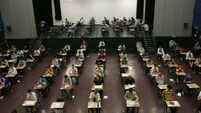Beyond the exam hall: Reclaiming the purpose of Irish education

For many families, grind schools can represent a perceived shortcut to success, a necessary investment in an increasingly competitive academic landscape.
Ireland's education system is rightly celebrated for its commitment to access and quality. Yet the proliferation and prominence of private grind schools and online tuition providers requires greater attention.
While these services undeniably offer supplementary learning, we need to turn a critical lens toward the unintended consequences, particularly their role in intensifying the Leaving Certificate points race, and their unique, unofficial status within our publicly funded system.
















